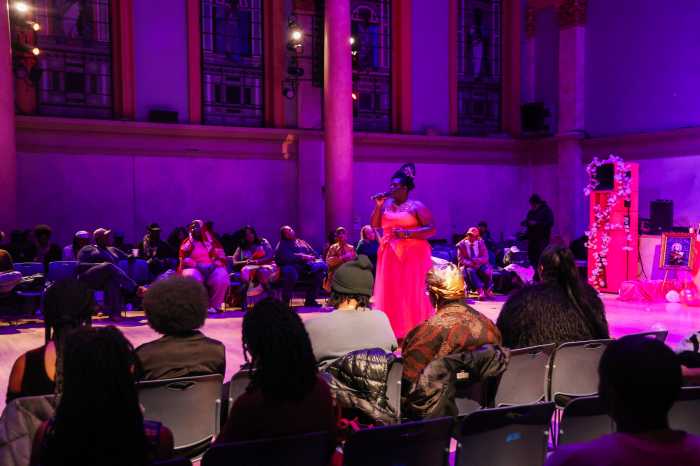They call me a legend,” Kaye Ballard told me, “but it’s only because I’ve lived this long.”
At the Bistro Awards, held on April 23, Ballard, 86, who has conquered the worlds of Broadway, movies, television, and cabaret, received the Bob Harrington Lifetime Achievement Award. “I loved that, but I wish I could get a Tony. You know, I was never even nominated. I should have been, for ‘Carnival,’ and I deserved an Obie for ‘The Golden Apple.’”
Ballard will be appearing at Feinstein’s at Loew’s Regency on June 17 (540 Park Ave. at 61st St.; feinsteinsattheregency.com), in a show entitled “Maybe This Time.” Yes, that Kander & Ebb classic was written for her, not Liza Minnelli, and she will explain it to you all. She also introduced one of the great songs, “Lazy Afternoon” in “The Golden Apple”: “The composer, John LaTouche, was a friend and used to come see me perform at the Bon Soir. He said, ‘Would you come over for dinner? I want to play the score for you.’ I heard that song and said in my heart, ‘I’ve got to sing that song!’ I did seven auditions for it. John always wanted me but the producers thought, ‘She’s just nightclub!’ But I got it, and it was unbelievable — those lyrics “You can hear the grass as it grows” — incredible, but all the lyrics were!”
Marc Blitzstein’s 1955 urban folk opera, “Reuben, Reuben” was a fascinating project: “Blitzstein was so brilliant, David, but he was content with failure, if you know what I mean. He was afraid to find out if he was a great success. Bobby Lewis was our great director, and when we did the run-through, it was so brilliant. But when we had a problem in Boston, Arthur Miller wanted to help Marc, but he wouldn’t accept any help. He was adamant about what he did, and he should have been a little more pliable.
“Also, Eddie Albert was fabulous in rehearsal, but he became frightened in front of an audience and became the Eddie Albert you saw in movies. Even when people were walking out and on opening night when we got the worst reviews, the cast all loved it so much we all offered to do it for free on a bare stage in New York. By that time, we had worked on it in Boston for three weeks and gotten standing ovations, but it was too late because the critics bombed it that first night.
“I loved it, because I was thin, and it was an attractive part and I had wonderful material. But there were other disappointments, like losing ‘Mame,’ the disappointment of my life. It was down to just me, Dolores Gray, and Angela Lansbury, and they told me I could never be from Beekman Place. I wanted to move there and send them a card which said, ‘You’re wrong.’ It broke my heart, and I thought, ‘Well, I’m just never gonna get anything really good.”
Ballard did get to be seen by more than 100 million people on the telecast of Rodgers & Hammerstein’s “Cinderella” in 1957: “When they played the score and recited the book, tears just ran down my face. Alice Ghostley was the best, the funniest, laughing at Julie Andrews, who was very good but didn’t want her costumes to be dirty, so the patches had to be specially sewn on them.
“I knew both Alice and Paul Lynde and, in answer to your wondering who stole comedically from whom, nobody stole anything from anybody. They just had that same personality and voice, and when they got together, it was hilarious. They were so alike.”
Ballard may not have a ton of awards, but she’s had famous friends galore, the cream of showbiz royalty, and she said, “My God, I’ve always been starstruck, so to get to know the people I worshipped, this little Italian girl from Cleveland, I couldn’t believe it!
“Judy Garland and Ethel Merman would come together to see me perform and do imitations in nightclubs all the time, and Judy would say, ‘Do me! Do me!’ I went to a friend’s house one night, and there was Irene Dunne, Greer Garson, and Joseph Cotten! They were talking about [the film] ‘Theodora Goes Wild,’ and Irene Dunne said, ‘Oh, no!’ She was embarrassed, she didn’t like it, and I said, ‘Are you kidding? Would you stop? You’re simply great in that!’ Greer Garson — I wouldn’t talk to her but I’d just look at her and whisper, ‘Random Harvest!’ And when she left, I said, ‘Good night, Mrs. Miniver.’
“Barbara Stanwyck was a very disciplined lady during the week when she worked, but on Friday night she’d get drunk until Sunday. She wasn’t as much fun as Bette Davis, whom I visited at the Lombardy Hotel. She answered the door herself and said, ‘Don’t evah have a stroke!’ And ‘Why couldn’t B.D. [her daughter] have waited until I was dead to write her book?’
“I was at B.D.’s 60th birthday party at the Plaza Hotel. Everyone was so old. I was around 30 and the youngest person there. B.D. said, ‘Oh, Mommy, Mommy, this is the most wonderful party!’ and Bette said, ‘Bullshit!’
“Cary Grant was the handsomest man I ever saw, and I asked him, ‘How do you stay so thin?’ He said, ‘I think thin.’ ‘I’ve tried that. It doesn’t work.’ But he appealed to men, women, dogs, cats, like Hugh Jackman now. Onstage no one’s better than he is, and I love the way his pants fit more than anything in the world. He has the most appealing body — ooh!”
Ballard, suddenly turning interviewer, herself, had a particular question she wanted to ask me: “David, why is it, if a woman is strong, why do they think she’s gay? In my early life, I did everything twice, and I found myself after 40, thinking, ‘This is ridiculous.’ I’m only happy working and with my dogs, but so many people terrorize you, saying, ‘Come out and say something!’ But I’m nothing. At the moment, I have someone who takes care of me, a friend for 40 years, but nothing! Why do they automatically think you have to make a declaration? I’m glad that Ellen and Rosie have done it, but I have no reason to do that and won’t.
“They used to say that about June Havoc, who had a lady with her all her life, who was like a nun. It was such a joke. June was one of the most wonderful people, totally heterosexual. All of my friends are gay and I love everybody for what they are, not what they do in bed. I don’t give a damn and don’t understand this attitude.”
French New Wave diva Bernadette Lafont was recently in town for her Alliance Francaise film retrospective, and Francophile that I am, I made sure to meet her. Her humorous face is miraculously unchanged from what it was in the 1970s, and, enjoying her chocolates and cigarettes, she described her amazingly long and productive career.
She made her debut in Francois Truffaut’s first film, “Les Mistons,” in 1957: “I was very close to him, and making our first film together created a very strong bond. Fifteen years later, we made ‘Such a Gorgeous Kid Like Me,’ and we hadn’t seen each other in all that time. I was an exception in that I was an actress who did not become involved with him. We could have and we would have, but he was engaged to be married at the time. I will tell you this because of the beautiful Missoni shirt you are wearing: something could have happened, but with a very beautiful set designer who was on the shoot whom I was more attracted to than Truffaut!”
“‘Such a Gorgeous Kid Like Me’ [1972] Truffaut shot after he had finished ‘Two English Girls,’ a very beautiful and sad romantic film. He was coming out of a big depression because of his relationship with Catherine Deneuve and really wanted to have fun. He loved my character of Camille, like his ‘Wild Child’ in the sense that everywhere she walks, the grass doesn’t grow back. She made him laugh and it was an incredibly joyous experience because we shot it outside Paris, all the actors would come and there would be parties and dinners.”
I told Lafont that her Camille, brash and singing wildly off-key, reminded me of the legendary actress Arletty, so unforgettable in the pre-War French poetic realist dramas that prefigured Lafont’s New Wave era. “I was a huge fan of hers and she knew of me, so she called and I went twice to her home. It was extraordinary to meet her! She was blind, but it didn’t show, and she was always all in white.”
Lafont’s next film was Jean Eustache’s starkly contrasting landmark “The Mother and the Whore,” an unbearably intense, sexual inferno of a love triangle lasting more than three and a half hours. About Eustache, who killed himself at 42, Lafont said, “He was a very complicated, extraordinary person, like an open scar. He couldn’t laugh at himself, which was quite annoying.
“I had just come from ‘Such a Gorgeous Kid,’ and the character of Camille kind of stayed with me, exuberant, hyper, and open. Eustache wanted something much more condensed and severe, and he kept saying it smelled like Truffaut, and he kept repeating this one line during the shoot.
“[My co-star] Jean-Pierre Leaud is an extraordinary actor, magnificent but in his life very complicated. In 1973, we went to New York to present the film at Lincoln Center. He was supposed to take the plane with us, but he could not get on it. He now looks very marked by life, but he’s kept his childish hair.”
Claude Chabrol made seven films with Lafont, and she contrasted him with Truffaut: “They were like black and white. Both originally film critics for Cahiers du Cinema magazine, they were always friends and always vying to see who was the smarter one. Both brilliant thinkers, but not in same manner. Chabrol came an aristocratic bourgeois background, as opposed to Truffaut, who came from a déclassé family. He nearly ended up in jail, so they had a different way of relating to work because of social class.
“When I made Chabrol’s wonderful ‘Violette,’ I had done seven films with him and, for me, it was like passing the torch to Isabelle Huppert, who then went on to make all those films with him. When I started making films, I was very free and could do my own makeup and choose my costumes and act however I wanted to. That changed over the years, and it took me 20 years to do what I wanted, which was to act in the theater, so different from cinema.
“I always hated my name, so low-class and chichi. I called myself Bettina, after the sublime model of the 1950s who dated Aly Khan. Truffaut would play with this, and Chabrol would also call me something that has no translation, Brunedette.”
Contact David Noh at Inthenoh@aol.com.


































